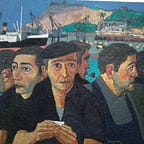Update from Catalonia
The uprising against the convictions of Catalan leaders was predicted. But by rioting, parts of the independence movement has entered uncharted territory.
Catalonia has had three days of rioting and blockades. Hundreds of thousands have marched and blocked highways after the Spanish supreme court handed long prison sentences to Catalan leaders involved in the independence referendum and protests of 2017. Teargas spread through Terminal 1 of Barcelona’s international airport, as thousands occupied it and forced the cancellation of more than a hundred flights. An international arrest warrant for the former Catalan President, Carles Puigdemont, still in exile, has been issued, and Puigdemont’s vice-president during that fateful autumn, Oriol Junqueras, has been sentenced to 13 years of political imprisonment.
For two years, the Spanish political and legal system has painted itself into a corner with trumped up accusations and charges of rebellion and sedition. There was no way the supreme court could have ruled in a way that facilitated de-escalation and dialogue. At the same time, there was no way the Catalan independence movement and radical democrats more widely could take these sentences lying down. After all, the Catalan leaders have been sentenced for the crime of setting up a democratic referendum on the future of their country, and for facilitating peaceful protests against the police violence that cracked down on the vote.
In many ways, Spain and Catalonia is stuck in a dilemma which will never be solved by the courts. Two years ago, I outlined the problem in this way: “The contradiction between the constitutional enabling of Catalan nation building and the prohibition of Catalan self-determination remains and has only been intensified. Of the three competing answers, none is currently feasible. Neither authoritarian Spanish centralism, nor independence, nor constitutional reform.” In other words, Catalan aspirations can’t be crushed, independence can’t carry a majority, nor can constitutional reform. This deadlock hasn’t come closer to a solution over the past two years, and many have actively sustained it.
Indeed, the continuation of the conflict serves most major Spanish political parties well with elections coming up on November 10th. The right (PP, Cs, Vox) all aim to build hegemony and mobilise the vote on a Spanish nationalist base, and the governing social democrats of PSOE, whose unwillingness to enter into government with left-wing Podemos has triggered the third general election in less than a year, can use the issue to distinguish to shift the discussion from the social question, on which it is unwilling to move much, to the national question in which pressure to share power with Podemos’ plurinational federalists is smaller.
Blockading highways is nothing new to the Catalan movement, nor is the call for a general strike, due tomorrow. But the rioting and generalized use of coordinated tactics without the ultimate control of the political leadership marks a new phase. Much of this is inspired by Hong Kong, as detailed in Quartz, and it is certainly inspired by a recognition of the limitations of the relatively orderly approach of 2017.
But just as one set of limitations are being overcome, another emerges. In 2017, I wrote that “any re-opening of the path towards independence would require a movement willing to use its capacity to render Catalonia ungovernable — a move unthinkable under bourgeois leadership, and minoritarian without it.”
This week, we have seen Catalan politicians order violent police actions to stop protests. Thousands have been tear gassed for peacefully blocking the airport, many shot with foam bullets, and yesterday at least two protesters were run down by police vans. There are calls for the independentist leader of the Catalan government, Quim Torra, to step down.
The movement increasingly has the streets, but it no longer has government. The constitutional deadlock is the same as ever, but the means to fight it are not. Perhaps many independentists will be anarchists by the end of this week, as Carlos Delclos quipped. Certainly many will have to find their feet anew. But as long as national independence is the end-all and be-all of the movement, it’s hard to see a way out of the perverse symbiosis of Spanish and Catalan nationalism.
